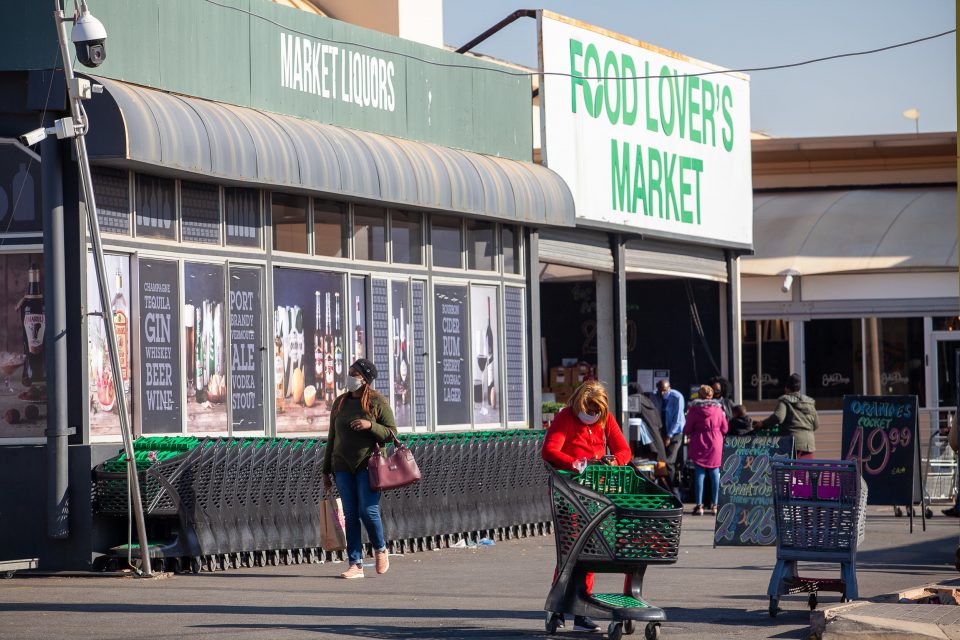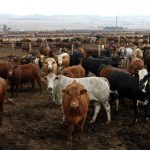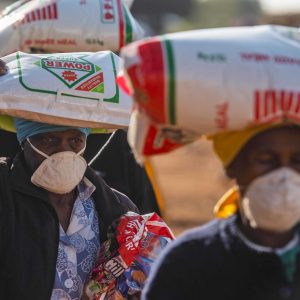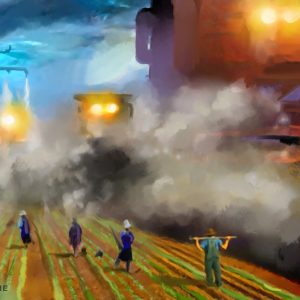SA companies cash in on Covid-19
In this fifth instalment in a series on the coronavirus and capitalism, New Frame traces how businesses hiked the prices of food and essential goods during the lockdown.
Author:
24 August 2020

As South Africa’s hard lockdown restrictions begin to ease, it is becoming clear that many companies used the pandemic as an opportunity to profiteer. The Competition Commission received over 800 complaints about pricing during the lockdown period. So far, these complaints have resulted in almost 30 convictions and settlements, with millions of rands in fines levied.
The guilty parties have ranged from mom-and-pop pharmacies to national chains such as Food Lover’s Market.
One hardware shop, for example, allegedly increased the price of surgical gloves from R100 to R170 in a single week; a pharmacy put a more than 300% markup on the price of face masks and hand sanitiser; and a supplier of face masks increased their price by 665%.
Related article:
Dis-Chem grabbed the headlines when it was found guilty of excessive pricing and fined R1.2 million. The Competition Commission’s investigation showed that the national pharmacy chain had inflated the average prices of three types of face masks by between 43% and 261% between February and March this year.
When Dis-Chem was first accused, chief officer Ivan Saltzman denied that the prices were excessive. At the tribunal hearing, Dis-Chem’s advocate Michelle le Roux argued that the commission was trying to find a good company to humiliate and make an example of.
The tribunal did not agree. They found Dis-Chem guilty and described its conduct as “utterly unreasonable and reprehensible”.
In its public reasons document, the tribunal noted: “Dis-Chem’s pricing conduct, of successive massive price increases in March, demonstrates that it exploited this crisis.”
Tracking food prices
Over a third of the complaints the Competition Commission received by the end of June related to food.
Concerned about the impact the cost of food will have on impoverished South Africans, the commission has been monitoring prices and, in mid-July, released a report titled Essential Food Price Monitoring.
It stated that much of the early food price increases were driven by the weakening of the rand and made worse by the panic buying that took place in the early days of the lockdown. Also, some food products were affected by Covid-19-related export restrictions.
But price gouging also got into the mix. Many shops increased the prices of food and other goods to levels much higher than is reasonable.
The commission dealt with a number of companies and businesses that took advantage of the lockdown. Food Lover’s Market, for example, settled with the commission on charges of excessive pricing for ginger.
Related article:
The company admitted that its average mark-up and gross profit margins for raw ginger was “unreasonably high for an essential product during the state of national disaster”.
Cambridge Food Jozini, based in KwaZulu-Natal, was also prosecuted by the commission. The company is a division of Cambridge Food and a subsidiary of Massmart Holdings. They were prosecuted for excessively increasing the price of 25kg bags of white mealie meal from R129.99 to R159.99 “without a corresponding increase in costs”.
Some researchers who have been independently tracking food prices during the Covid-19 lockdown are not entirely happy with the Competition Commission’s work, which is limited by its mandate. It is only concerned, they argue, with whether a retail price is fair, not whether it is affordable to all.
Food price spikes
Julie Smith, a researcher at the Pietermaritzburg Economic Justice and Dignity Group, says as soon as Covid-19 hit South Africa, they started tracking food prices.
“I’m glad we did that, otherwise the narrative would be that food prices are stable,” she says. “The reality for someone shopping is that they are paying more. Our data shows it. Prices have shot up.”
In June, the group released its most recent research report on food prices.
Smith says products that showed significant price increases between April and June include staples such as rice (29%), cake flour (7%), cooking oil (13%) and bread (14% to 16%). Also affected are affordable sources of protein such as eggs (18%), pilchards (3%), sugar beans (18%) and amasi (9%).
“Vegetable prices went absolutely ballistic,” she says. Smith says the price of onions increased by 60%, carrots by 34%, spinach by 25% and cabbage by 20%.
The report also shows that impoverished households have “no more capacity” to absorb shocks.
“The food price increases we are seeing in Pietermaritzburg are considerable,” reads the report. “An 8.2% or additional R265 increase on the cost of a basic basket of core staple foods over the past three months, for families living on low incomes, is a serious financial shock.”
Fairness versus affordability
Smith says prices have started to come down, but are still “much higher” than pre-lockdown amounts.
This chimes with the Competition Commission’s findings. Most food commodity and fresh produce prices are now on the decline, and retailers have the potential to ease consumer pressure if they lower prices further.
But the commission points out that this outcome “is not necessarily certain”.
“It is often observed that food prices are quick to go up and slow to come down, if at all,” states the commission’s report. “Prior price increases resulting from initial food inflation can no longer be justified by costs if such costs have come down.”
Talking about the Competition Commission’s report on food price monitoring, Smith says that the commission’s role is to look at the fairness of pricing.
Related article:
“What it doesn’t look at is food prices in relation to affordability,” she says. “It’s not a political body, so that’s not its job.”
Smith also argues that the Department of Trade, Industry and Competition’s disaster management regulations aimed at preventing price gouging missed key staples such as bread, eggs, fresh vegetables, sugar beans and amasi.
“Those food items should have been included, but they weren’t there,” she says.
Smith says the Pietermaritzburg Economic Justice and Dignity Group does not track food prices at the big four supermarkets, as these retailers are too expensive for low-income households.
“Most low-income families buy their fruit, vegetables and eggs on the street. They can buy in smaller quantities and check the quality of the food,” she says. “The lockdown disrupted that and meant that families were forced into buying more of their food from the big retailers.”
To cover the extra costs, families had to leave out certain important food products, which has consequences for the families’ health. “Who benefited out of all of this?” Smith asks, before answering, “The big four.”
The big four
Food security specialist Tracy Ledger argues that the Covid-19 lockdown benefitted the big four food retailers – Shoprite/Checkers, Spar, Pick n Pay and Woolworths – and that this is not unusual.
“Covid-19 has exposed the vulnerability of so many households,” says Ledger. “It didn’t create the problem. In South Africa, a small group of corporates are deciding who gets to eat and who doesn’t get to eat and what they get to eat. Everyone acts as if the informal sector is a massive inconvenience. There is no support for the informal sector and a complete disregard for the central role it plays in how people access food.
“The current food system doesn’t fit the requirements of the country. There is a fundamental mismatch. It’s not a market failure. It’s the way the market is designed to work.
Related article:
“This market treats poor households with absolute disdain even though they are the reasons all the bosses get big bonuses every year.”
She argues that access to food is very much determined by people’s income, with most households unable to afford a balanced nutritious diet.
“You can only fix this by adjusting people’s income or adjusting food prices,” says Ledger.
But the government doesn’t regulate the food sector at all, she argues.
Pick n Pay spokesperson Janine Caradonna says the food retailer has “worked hard to keep any price increases to a minimum during the crisis.”
“We have a long track record of keeping our levels of inflation inside the company well below general food inflation as reported by the government. As to operating during the lockdown, the government designated food stores as essential services, and we worked hard to ensure that our shops remained open and stocked with the products that customers needed.”
Power over suppliers
Ledger argues that South Africa’s big food retailers are “vertically integrated value chains”, where they have “buyer power” and can “extract value out of suppliers”.
She argues that this is why there is such a big disparity between the farm gate price and the retail price in South Africa.
The Competition Commission’s recent food price monitoring report also flagged this discrepancy. The commission feels the discrepancy points to “market failures” in the country’s food sector “that warrant further investigation”.
Related article:
“The disparity between farm prices and retail prices raises serious questions as to the distribution of risk and profits in the value chain,” reads the report.
“Small fresh produce markets also lack the same liquidity as larger markets making them more vulnerable to price volatility and manipulation; and the practice by some suppliers and retailers of immediately pricing up to expected cost increases despite lower cost product in stock is both questionable and inflationary.”
The commission’s head economist, James Hodge, explains that farmers are carrying most of the risk but very little of the profit, a situation he described as “quite alarming”.
“There is a need to bring down the mark-ups through the chain,” says Hodge. “It has been highlighted during the crisis, and we are concerned and will continue to investigate. It has to be addressed.”
While the announcement that the commission will investigate the discrepancies between farm gate and retail prices is positive, it is not going to do anything to assist impoverished families struggling to put food on the table now.
Emerging hunger hotspot
At the recent launch of the National Income Dynamics Study – Coronavirus Rapid Mobile Survey, Ruth Hall from the Institute for Poverty, Land and Agrarian Studies at the University of the Western Cape said the hunger crisis in the country showed that South Africa’s food system, dominated by the four major food retailers, was “broken”.
She called the results of the survey “terrifying”. The researchers surveyed 7 000 households and found that 47% of respondents reported that their household ran out of food money in April 2020.
Related article:
An Oxfam report released in early July, titled The Hunger: How Covid-19 is Fuelling Hunger in a Hungry World, identified South Africa as an emerging hotspot for hunger and mentioned the impact the lockdown had on the informal food sector.
“The closure of street food vendors, which support an estimated 500 000 livelihoods and provide food for 70% of township households, is having a dramatic impact on both the farmers that supply them and on what people can buy and eat – with many people consuming fewer fresh fruits and vegetables,” reads the report. “Weekly polling conducted since the start of lockdown has revealed that unemployment and loss of income is having a direct impact on food security. One in three adults surveyed said they were going to bed hungry, and a fifth had lost weight during the lockdown because of a lack of food.”
South Africa’s unfair and fragile food system has been exposed by Covid-19. Where is the political will to fix the problem?






